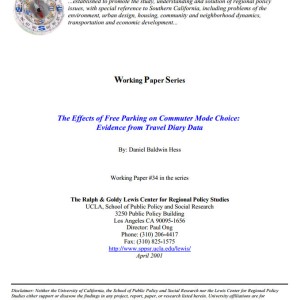
Authors: Daniel Baldwin Hess
Date: April 1, 2001
Project: [wpv-post-link id=”$project”]
This study assesses the effect of free parking on mode choice and parking demand. A multinomial logit model is developed to evaluate the probabilities that commuters who do and who do not receive free parking at work will choose to drive alone, ride in a carpool, or use transit for the trip to work in Portland’s (Oregon) CBD. The mode choice model predicts that with free parking, 62 percent of commuters will drive alone, 16 percent will commute in carpools and 22 percent will ride transit; with a daily parking charge of $6, 46 percent will drive alone, 4 percent will ride in carpools and 50 percent will ride transit. The mode choice model predicts that a daily parking charge of $6 in the Portland CBD would result in 21 fewer cars driven for every 100 commuters. This translates to a daily reduction of 147 VMT per 100 commuters and an annual reduction of 39,000 VMT per 100 commuters. These findings are consistent with previous studies of the effect of parking cost on mode choice. The policy variables that play a part in mode choice decisions for commuters are the parking cost and the travel time by transit, and the results suggest that raising the cost of parking at work sites and decreasing the transit travel time (by improving service and decreasing headways) will reduce the drive alone mode share. The results provide little support for the contention that land use is a significant factor in mode choice decisions.
Link to Publication